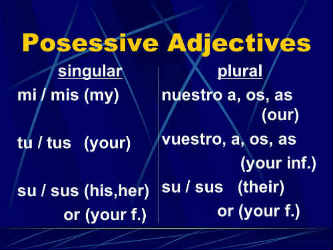Spanish Possessive Adjectives

When speaking Spanish, possessive adjectives are used very differently than when speaking English. When you need to express the possessive adjective (my, your, his, her, our, your, their), please recall that, as with any adjective, the possessive adjective must agree with the noun described in number and gender.
If the object possessed is singular, there is a set of adjectives; if the object possessed is plural, there is another set of adjectives. The adjective depends on the owner, as well. For example: if I own something, and I am referring to"my" belonging, I will decide whether or not to use the singular or plural form of "my" - Spanish has one form for the singular noun, and another form for the plural noun.
English: José sees my yellow banana.
Spanish: José ve mi banano amarillo.
What does José see? the yellow banana; whose yellow banana?
el banano - masculine singular; my yellow banana - mi banano amarillo
If José had seen more than one of my bananas, it would be:
José ve mis bananos amarillos.
Let's review the example sentences below.
Esta es mi casa.
This is my house.
Esta es su mesa.
This is your table.
Estos son tus zapatos.
These are your shoes.
Esa es mi habitación.
That is my room.
Aquellas son vuestras chaquetas.
Those are your jackets.
Ese es mi poder.
That is my power.
Estos son tus libros.
These are your books.
Esas son mis llaves.
Those are my keys.
Aquellos son sus paraguas.
Those are your umbrellas.
Esta es su falda.
This is your skirt.
Este es vuestro coche.
This is your car.
Popular Phrase: conjugate empezar | Future Tense | Conjugated Verb: verter - to spill [ click for full conjugation ]
